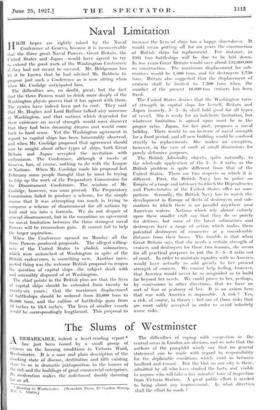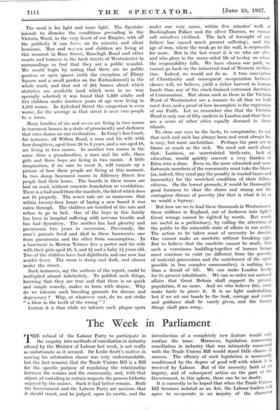The Slums of Westminster
AREMARKABLE, indeed a heart-rending report * has just been issued by a" small group of citizens on the housing conditions in Victoria Ward, Westminster, It is a sane and plain description :of the shocking state of disease, destitution and filth existing. close to us in dramatic juxtaposition to the houses of the rich and the buildings of great commercial enterprises. Its moderation makes the 'indictment doubly damning for us. all.
•
Housing Ag I 4 Westminster. Gratis.)
OVeardEde Press, 25 Gordon Streets
The difficulties of coping with congestion in the central areas in London are obvious, and we note that the authors of the pamphlet wisely say that no general statement can be made with regard to responsibility for the deplorable conditions which exist as between landlord and tenant. But the blot on our city is there, admitted by all who have studied the facts, and visible to anyone who will take a five minutes' tour of inspection from Victoria Station. A great public effort is needed to bring about any improvement. In what direction shall the effort be made ? The need is for light and more light. The Spectator intends to illumine the conditions prevailing in the Victoria Ward, in the very heart of our Empire, with all the publicity it can focus on its miseries and silent heroisms. Men and women and children are living at this moment in Ross Street, Ranelagh Road and other courts and terraces in the back streets of. Westminster in surroundings so foul that they are a public scandal. We would begin by noting that there are no public gardens or open spaces (with the exception of Ebury Square and a small garden on the Embankment) in the whole ward, and that out of 261 houses about which statistics are available (and which were in no way specially selected) it was found that 1,320 adults and 514 children under fourteen years of age were living in 1,359 rooms. In Aylesford Street the congestion is even worse, for the average in that street is over two people to a room.
Many families of six and seven arc living in two rooms in tenement houses in a state of promiscuity and darkness that cries shame on our civilization. In Gray's Inn Court, for instance, off Wilton Road, a man and his wife with four daughters, aged from 20 to .5 years, and a son aged 18, are living in two rooms. In another two rooms in the same slum a grandmother, a man and his wife, three girls and three boys are living in two rooms. A little imagination, if we care to exert it, will conjure up a picture of how these people are living at this moment. In two damp basement rooms in Alderney Street five people find their home. The boards in these rooms are laid on mud, without concrete foundation or ventilation. There is a bad smell from the manhole, the lid of which does not fit properly. The sewer rats are so numerous that within twenty-four hours of laying a new board it was eaten through. The children are terrified of the rats and refuse to go to bed. One of the boys in this family has been in hospital suffering with nervous trouble and has had dysentery. The mother has had pleurisy and pneumonia two years in succession. Previously, the man's parents lived and died in these basements, one from pneumonia and the other from consumption. In a basement in Morton Terrace live a porter and his wife with their girls aged 10, 5, and 2i and a baby 11 years old. Two of the children have had diphtheria and one now has scarlet fever. The room is damp and dark, and almost under the street.
Such instances, say the authors of the report, could be multiplied almost indefinitely. To publish such things, knowing that they are true and that there is no quick and simple remedy, makes us burn with shame. Why do we tolerate such breeding grounds for disease and degeneracy 1' Why, at whatever cost, do we not strike " a blow in the teeth of the wrong " ?
Certain it is that while we tolerate such plague spots under our very _ noses, within five minutes' walk of Buckingham Palace and the silver Thames, we cannot call ourselves civilized. The lack of foresight of our fathers has caused much present suffering ; and this age of iron, where the weak go to the wall, is responsible for more. But in the last resort it is we who are alive and who glory in the many-sided life of to-day, on whom the responsibility falls: We have chosen our path, w•e cannot go back on the industrial road of Western civilize. tion. Indeed, we would not do so. A true conception of Christianity and consequent co-operation between classes will, we believe, yield a richer harvest in human hands than any of the crack-brained extremist doctrines of Communism. But slums such as these in the Victoria Ward of Westminster area menace to all that we hold most dear, and a proof of how incomplete is the expression of our Faith. Let us remember also that the Victoria Ward is only one of fifty cankers in London and that there are a score of other cities equally diseased in these islands.
To close our eyes to the facts, to compromise, to say that such and such has always been and must always be, is easy, but most unchristian. Perhaps the poor are to blame as much as the rich. We need not cavil about that. Laziness,. an unrestricted birth-rate, lack of education, would quickly convert a very Garden of Eden into a slum. Even so, the more educated and more fortunate members of the community must take the blame (as, indeed, they must pay the penalty in wasted taxes and insecurity) for the wretched condition of their fellow- citizens. On the lowest grounds, it would be thoroughly good business to clear the. slums and stamp out the contagious disease of poverty (for that is what it is) as we would a leprosy. .
But how are we to lead these thousands in Westminster, these millions in England, out of darkness into light ? Great wrongs cannot be righted by words. But words are useful as a preliminary, by calling the attention of the public to the miserable state of affairs in our midst. The action to be taken must of necessity be drastic. One cannot make an omelette without breaking eggs. But to believe that the omelette cannot be made, that such a verminous huddling-together of human beings must continue to exist (so different from the poverty of material possessions and the enrichment of the spirit possible in less complex communities), is nothing less than a denial of life. We can make London lovely for its present inhabitants. We can so order our national affairs that Great Britain shall support its present population, if no more. And we who believe this, must make haste to prove it. It is no light undertaking, but if we set our hands to the task, courage and vision and guidance shall be surely given, and the former things shall pass away.















































 Previous page
Previous page